外研版八年级英语上册Module 6 Animals in danger. Unit 1教学课件(共25张PPT+内嵌音频)
文档属性
| 名称 | 外研版八年级英语上册Module 6 Animals in danger. Unit 1教学课件(共25张PPT+内嵌音频) | 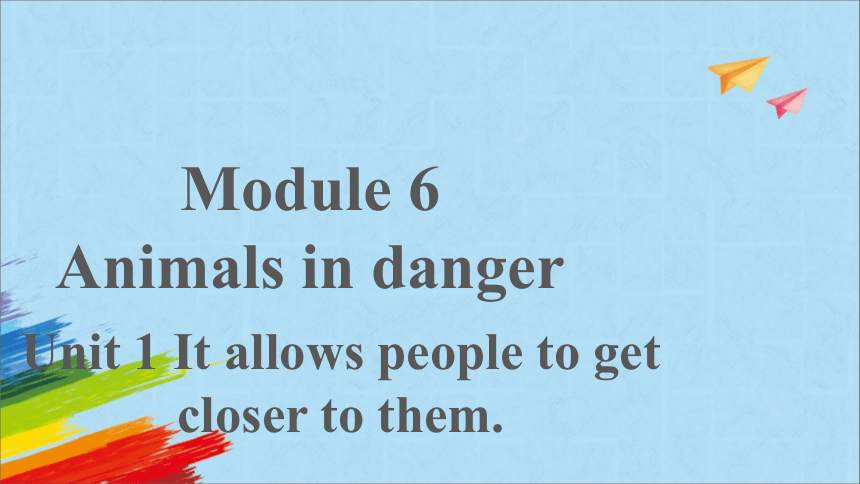 | |
| 格式 | pptx | ||
| 文件大小 | 7.3MB | ||
| 资源类型 | 教案 | ||
| 版本资源 | 外研版 | ||
| 科目 | 英语 | ||
| 更新时间 | 2022-10-14 21:03:25 | ||
图片预览

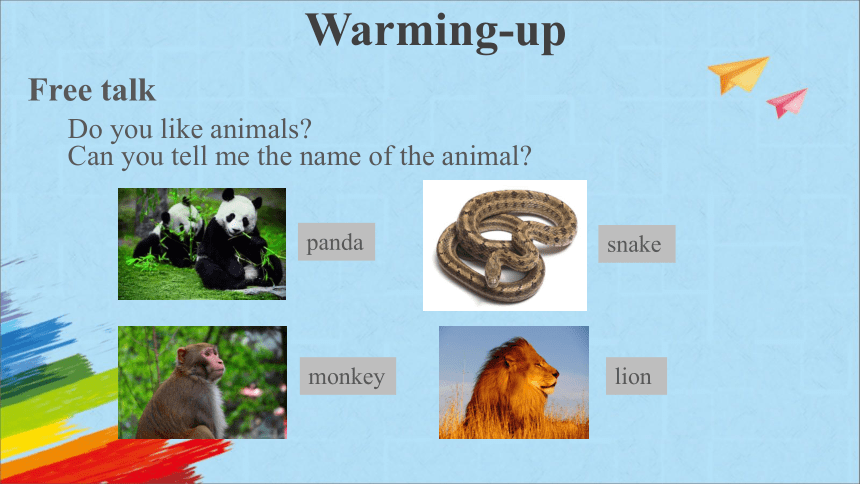
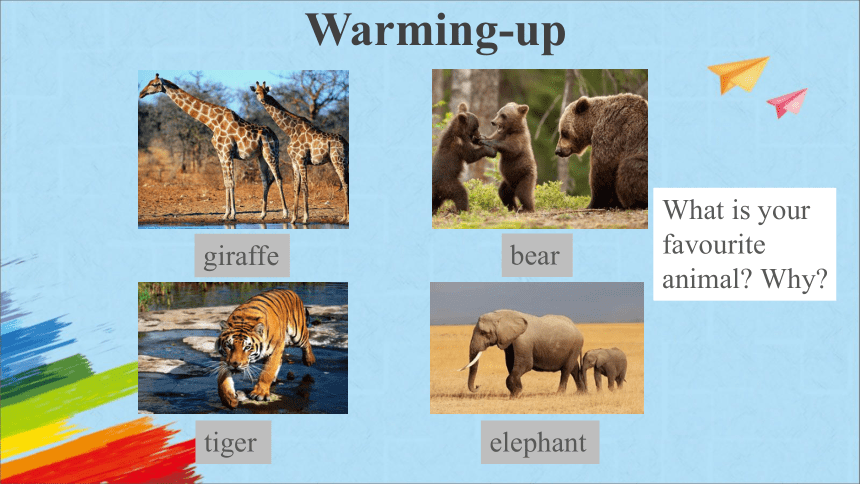
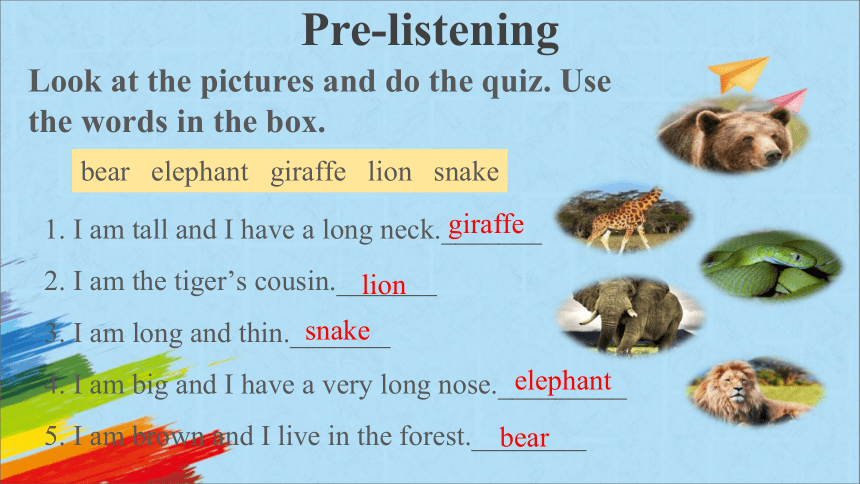
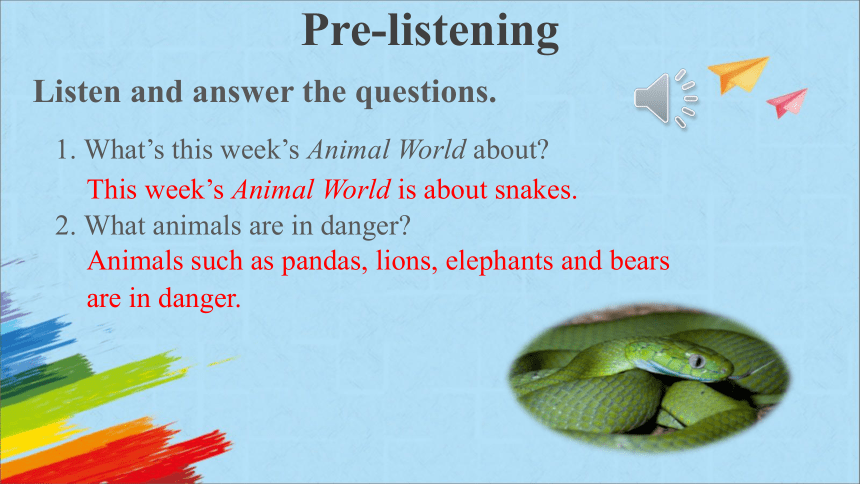
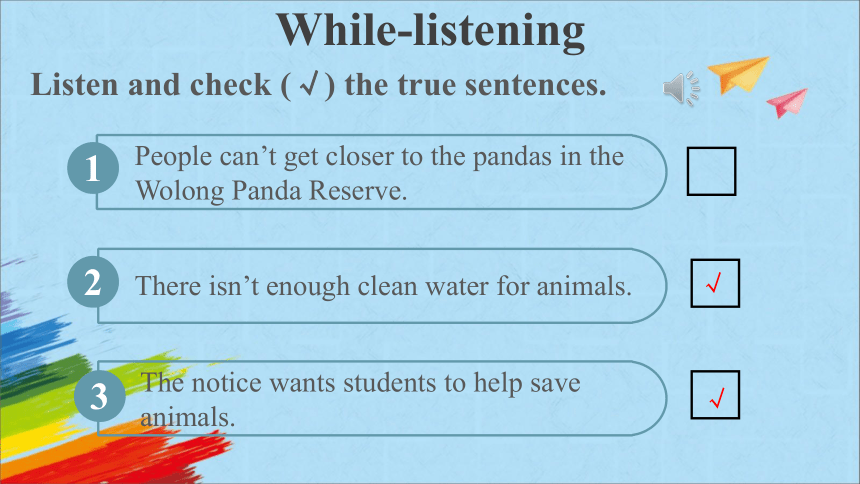
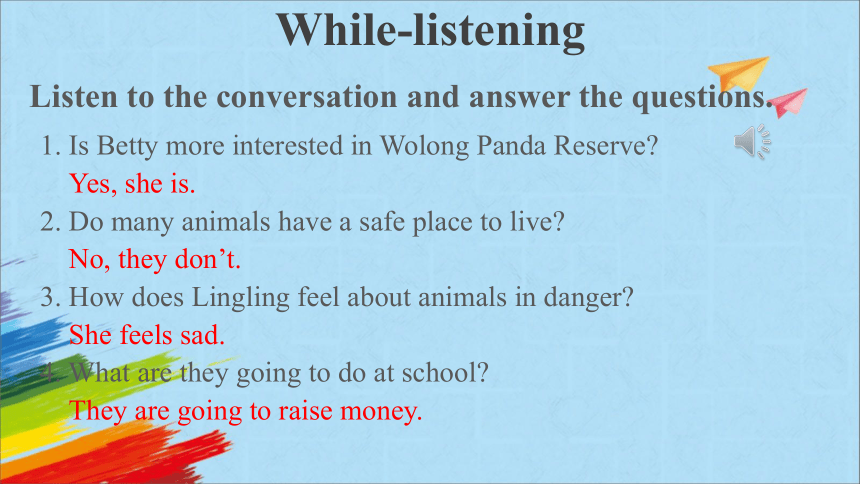
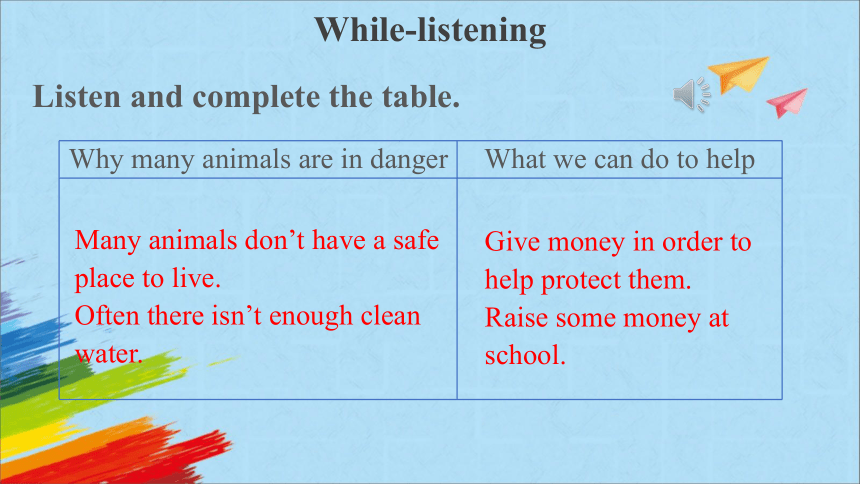
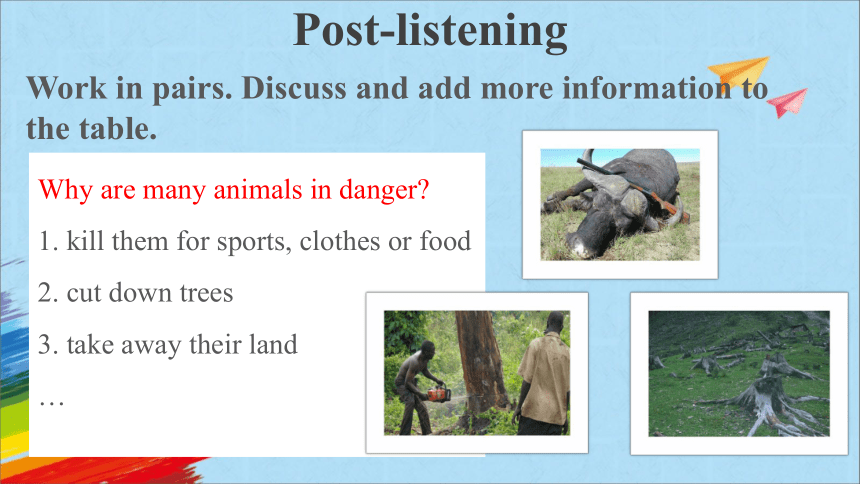
文档简介
(共25张PPT)
Module 6
Animals in danger
Unit 1 It allows people to get closer to them.
Do you like animals
Can you tell me the name of the animal
Free talk
Warming-up
snake
panda
monkey
lion
giraffe
elephant
tiger
bear
Warming-up
What is your favourite animal Why
Look at the pictures and do the quiz. Use the words in the box.
1. I am tall and I have a long neck._______
2. I am the tiger’s cousin._______
3. I am long and thin._______
4. I am big and I have a very long nose._________
5. I am brown and I live in the forest.________
giraffe
lion
snake
elephant
bear
bear elephant giraffe lion snake
Pre-listening
1. What’s this week’s Animal World about
2. What animals are in danger
This week’s Animal World is about snakes.
Animals such as pandas, lions, elephants and bears are in danger.
Listen and answer the questions.
Pre-listening
1
2
3
Listen and check (√) the true sentences.
While-listening
√
√
There isn’t enough clean water for animals.
People can’t get closer to the pandas in the Wolong Panda Reserve.
The notice wants students to help save animals.
1. Is Betty more interested in Wolong Panda Reserve
Yes, she is.
2. Do many animals have a safe place to live
No, they don’t.
3. How does Lingling feel about animals in danger
She feels sad.
4. What are they going to do at school
They are going to raise money.
Listen to the conversation and answer the questions.
While-listening
Listen and complete the table.
Why many animals are in danger What we can do to help
Many animals don’t have a safe place to live.
Often there isn’t enough clean water.
Give money in order to
help protect them.
Raise some money at
school.
While-listening
Post-listening
Work in pairs. Discuss and add more information to the table.
Why are many animals in danger
1. kill them for sports, clothes or food
2. cut down trees
3. take away their land
…
Post-listening
What can we do to help the animals in danger
1. build some reserves
2. keep the water clean
3. plant more trees
…
1. But I am more interested to see the pandas in the Wolong Panda Reserve,
because it allows people to get closer to them.
但我对在卧龙大熊猫自然保护区看大熊猫更感兴趣,因为它允许
人们更近距离地接触它们。
(1) be interested to do sth. 意为“对做……感兴趣”;be interested in sth. 意
为“对……感兴趣”;be more interested in… 意为“对……更感兴趣”。
e.g. I’m interested to know what happened.
Post-listening
Language points
(2) to get closer to them在句中作宾语补足语,类似的结构有很多,例如:ask sb. to do sth. 意为“请求某人做某事”;need sb. to do sth. 意为“需要某人做某事”;want sb. to do sth. 意为“想要某人做某事”;allow sb. to do sth. 意为“允许某人去做某事”。
e.g. His father doesn’t allow him to play before he finishing his
homework.
Post-listening
2. It’s sad to think of pandas and other animals in danger.
想起大熊猫和其他濒危动物来,真让人伤心。
think of 意为“想到,想出”;in danger 意为“处于险境,处于危险之中”。
e.g. What do you think of the zoo
The girl is very ill and her life is in danger.
3. Many wild animals don’t have a safe place to live, because villages and farms
are growing bigger and are taking away their land and forests.
很多野生动物缺乏安全的生存环境,因为村庄和农场正在不断地扩张,侵
占了它们的土地和森林。
take away 意为“夺去,拿走”。如果是代词作宾语要放在两词中间。
e.g. Please take them away.
Post-listening
4. I think we all need to help animals live in peace.
我想我们大家都需要帮助动物,让它们平静地生活。
(1) 当need作实义动词时,意为“需要”。
当主语是人时,用need to do;当主语是物时,用need doing/to be done。
e.g. We need to learn English quickly.
The trees need watering.
(2) need 作情态动词时,用于疑问句或否定句中。后面接动词原形,意为
“需要;必须”。
e.g. Need he sweep the floor now
Post-listening
5. Your money pays to look after the animals.
你捐的钱将用于看护动物。
look after 意为“照看,照顾”。
e.g. Susan looked after us very well.
6. Let’s find out what else we can do to save as many animals as possible.
让我们想想还能做什么,来救助更多的动物。
find out 意为“查明,找出”。
e.g. Please find out when the train leaves.
Post-listening
Many wild animals, such as pandas, are in (1) _______. We need to (2) _______ them! Often there is not (3) ________ land or forests, so the animals do not have a safe place to live.
The Wolong Panda Reserve (4) _______ people to get closer to pandas. And the pandas live (5) ________ there. We can help (6) ______ money to protect pandas and other wild animals.
allows danger enough in peace protect raise
protect
raise
allows
danger
enough
in peace
Complete the passage with the words and expression in the box.
Post-listening
1. It allows people to get closer to them.
2. We want to save animals in danger, and we need your help.
3. We can give money to help protect the animals.
Listen and mark when the speaker pauses.
Tips:听的时候注意句子的断句位置。
/
/
/
/
按照句子的一般语法结构来看,可划分成为以下意群视读单位:
短句 (2) 名词短语 (3) 介词/不定式/分词短语
(4) 动词短语 (5) 主谓结构 (6) 动宾结构
(7) 系表结构 (8) 动状结构 (9) 主句-从句。
Post-listening
1. It allows people to get closer to them.
2. We want to save animals in danger, and we need your help.
3. We can give money to help protect the animals.
Listen again and repeat.
/
/
/
/
Post-listening
1. Why do you visit the zoo
2. Do you think animals are happy in the zoo
3. Where do most animals live
4. What can we do to help the animals
Work in pairs. Ask and answer the questions.
Post-listening
Talk with your partner about what we can do to protect
animals in danger. Then share your ideas with the rest
of the class.
—To protect... we should...
—We need to... to protect...
e.g.
—To protect the pandas, we should plant more bamboo.
—We need to plant more bamboo to protect the pandas.
Post-listening
1. My father’s job is ___ animals.
A. feed B. to feed
2. He hurried to school without ___ breakfast.
A. having B. have
3. ___ is difficult for him ___ the book.
A. That; read B. It; to read
4. I’m ___ in the ___ story.
A. interesting; interested B. interested; interesting
一、选择填空。
Test
Post-listening
1. You are no longer a child and you should learn to
p______ yourself.
2. It’s better for the animals to live in the w____.
3. 15 minutes is e______ time for you to have a coffee.
4. Giraffes have very long n____.
5. That n_____ on the wall says “No smoking”.
rotect
ild
nough
ecks
otice
二、根据句意及首字母提示,完成下列句子。
Post-listening
Key words and expressions:
snake, neck, thin, danger, interested, allow, protect, wild, grow, enough, peace, notice, raise, in danger, at last, think of, take away, in peace, look after
Key sentences:
But I am more interested to see the pandas in the Wolong Panda Reserve, because it allows people to get closer to them.
It’s sad to think of pandas and other animals in danger.
I think we all need to help animals live in peace.
Let’s find out what else we can do to save as many animals as possible.
Summary
Homework
1. Recite the new words and phrases in this unit.
2. Preview new words and expressions of Unit 2.
3. Search for some information about WWF and
giant pandas.
Goodbye!
Module 6
Animals in danger
Unit 1 It allows people to get closer to them.
Do you like animals
Can you tell me the name of the animal
Free talk
Warming-up
snake
panda
monkey
lion
giraffe
elephant
tiger
bear
Warming-up
What is your favourite animal Why
Look at the pictures and do the quiz. Use the words in the box.
1. I am tall and I have a long neck._______
2. I am the tiger’s cousin._______
3. I am long and thin._______
4. I am big and I have a very long nose._________
5. I am brown and I live in the forest.________
giraffe
lion
snake
elephant
bear
bear elephant giraffe lion snake
Pre-listening
1. What’s this week’s Animal World about
2. What animals are in danger
This week’s Animal World is about snakes.
Animals such as pandas, lions, elephants and bears are in danger.
Listen and answer the questions.
Pre-listening
1
2
3
Listen and check (√) the true sentences.
While-listening
√
√
There isn’t enough clean water for animals.
People can’t get closer to the pandas in the Wolong Panda Reserve.
The notice wants students to help save animals.
1. Is Betty more interested in Wolong Panda Reserve
Yes, she is.
2. Do many animals have a safe place to live
No, they don’t.
3. How does Lingling feel about animals in danger
She feels sad.
4. What are they going to do at school
They are going to raise money.
Listen to the conversation and answer the questions.
While-listening
Listen and complete the table.
Why many animals are in danger What we can do to help
Many animals don’t have a safe place to live.
Often there isn’t enough clean water.
Give money in order to
help protect them.
Raise some money at
school.
While-listening
Post-listening
Work in pairs. Discuss and add more information to the table.
Why are many animals in danger
1. kill them for sports, clothes or food
2. cut down trees
3. take away their land
…
Post-listening
What can we do to help the animals in danger
1. build some reserves
2. keep the water clean
3. plant more trees
…
1. But I am more interested to see the pandas in the Wolong Panda Reserve,
because it allows people to get closer to them.
但我对在卧龙大熊猫自然保护区看大熊猫更感兴趣,因为它允许
人们更近距离地接触它们。
(1) be interested to do sth. 意为“对做……感兴趣”;be interested in sth. 意
为“对……感兴趣”;be more interested in… 意为“对……更感兴趣”。
e.g. I’m interested to know what happened.
Post-listening
Language points
(2) to get closer to them在句中作宾语补足语,类似的结构有很多,例如:ask sb. to do sth. 意为“请求某人做某事”;need sb. to do sth. 意为“需要某人做某事”;want sb. to do sth. 意为“想要某人做某事”;allow sb. to do sth. 意为“允许某人去做某事”。
e.g. His father doesn’t allow him to play before he finishing his
homework.
Post-listening
2. It’s sad to think of pandas and other animals in danger.
想起大熊猫和其他濒危动物来,真让人伤心。
think of 意为“想到,想出”;in danger 意为“处于险境,处于危险之中”。
e.g. What do you think of the zoo
The girl is very ill and her life is in danger.
3. Many wild animals don’t have a safe place to live, because villages and farms
are growing bigger and are taking away their land and forests.
很多野生动物缺乏安全的生存环境,因为村庄和农场正在不断地扩张,侵
占了它们的土地和森林。
take away 意为“夺去,拿走”。如果是代词作宾语要放在两词中间。
e.g. Please take them away.
Post-listening
4. I think we all need to help animals live in peace.
我想我们大家都需要帮助动物,让它们平静地生活。
(1) 当need作实义动词时,意为“需要”。
当主语是人时,用need to do;当主语是物时,用need doing/to be done。
e.g. We need to learn English quickly.
The trees need watering.
(2) need 作情态动词时,用于疑问句或否定句中。后面接动词原形,意为
“需要;必须”。
e.g. Need he sweep the floor now
Post-listening
5. Your money pays to look after the animals.
你捐的钱将用于看护动物。
look after 意为“照看,照顾”。
e.g. Susan looked after us very well.
6. Let’s find out what else we can do to save as many animals as possible.
让我们想想还能做什么,来救助更多的动物。
find out 意为“查明,找出”。
e.g. Please find out when the train leaves.
Post-listening
Many wild animals, such as pandas, are in (1) _______. We need to (2) _______ them! Often there is not (3) ________ land or forests, so the animals do not have a safe place to live.
The Wolong Panda Reserve (4) _______ people to get closer to pandas. And the pandas live (5) ________ there. We can help (6) ______ money to protect pandas and other wild animals.
allows danger enough in peace protect raise
protect
raise
allows
danger
enough
in peace
Complete the passage with the words and expression in the box.
Post-listening
1. It allows people to get closer to them.
2. We want to save animals in danger, and we need your help.
3. We can give money to help protect the animals.
Listen and mark when the speaker pauses.
Tips:听的时候注意句子的断句位置。
/
/
/
/
按照句子的一般语法结构来看,可划分成为以下意群视读单位:
短句 (2) 名词短语 (3) 介词/不定式/分词短语
(4) 动词短语 (5) 主谓结构 (6) 动宾结构
(7) 系表结构 (8) 动状结构 (9) 主句-从句。
Post-listening
1. It allows people to get closer to them.
2. We want to save animals in danger, and we need your help.
3. We can give money to help protect the animals.
Listen again and repeat.
/
/
/
/
Post-listening
1. Why do you visit the zoo
2. Do you think animals are happy in the zoo
3. Where do most animals live
4. What can we do to help the animals
Work in pairs. Ask and answer the questions.
Post-listening
Talk with your partner about what we can do to protect
animals in danger. Then share your ideas with the rest
of the class.
—To protect... we should...
—We need to... to protect...
e.g.
—To protect the pandas, we should plant more bamboo.
—We need to plant more bamboo to protect the pandas.
Post-listening
1. My father’s job is ___ animals.
A. feed B. to feed
2. He hurried to school without ___ breakfast.
A. having B. have
3. ___ is difficult for him ___ the book.
A. That; read B. It; to read
4. I’m ___ in the ___ story.
A. interesting; interested B. interested; interesting
一、选择填空。
Test
Post-listening
1. You are no longer a child and you should learn to
p______ yourself.
2. It’s better for the animals to live in the w____.
3. 15 minutes is e______ time for you to have a coffee.
4. Giraffes have very long n____.
5. That n_____ on the wall says “No smoking”.
rotect
ild
nough
ecks
otice
二、根据句意及首字母提示,完成下列句子。
Post-listening
Key words and expressions:
snake, neck, thin, danger, interested, allow, protect, wild, grow, enough, peace, notice, raise, in danger, at last, think of, take away, in peace, look after
Key sentences:
But I am more interested to see the pandas in the Wolong Panda Reserve, because it allows people to get closer to them.
It’s sad to think of pandas and other animals in danger.
I think we all need to help animals live in peace.
Let’s find out what else we can do to save as many animals as possible.
Summary
Homework
1. Recite the new words and phrases in this unit.
2. Preview new words and expressions of Unit 2.
3. Search for some information about WWF and
giant pandas.
Goodbye!
同课章节目录
- Module 1 How to learn English
- Unit 1 Let's try to speak English as much as possi
- Unit 2 You should smile at her.
- Unit 3 Language in use .
- Module 2 My home town and my country
- Unit 1 It's taller than many other buildings.
- Unit 2 Cambridge is a beautiful city in the east o
- Unit 3 Language in use .
- Module 3 Sports.
- Unit 1 Nothing is more exciting than playing tenni
- Unit 2 This year we training more carefully.
- Unit 3 Language in use .
- Module 4 Planes, ships and trains .
- Unit 1 He lives the farthest from school.
- Unit 2 What is the best way to travel.
- Unit 3 Language in use .
- Module 5 Lao She Teahouse.
- Unit 1 I wanted to see the Beijing Opera.
- Unit 2 It descibes the changes in Chinese society.
- Unit 3 Language in use .
- Module 6 Animals in danger.
- Unit 1 It allows people to get closer to them .
- Unit 2 The WWF is working hard to save them all.
- Unit 3 Language in use .
- Revision module A
- Module 7 A famous story
- Unit 1 Alice was sitting with her sister by the ri
- Unit 2 She was thinking about her cat.
- Unit 3 Language in use .
- Module 8 Accidents
- Unit 1 While the car were changing to red, a car s
- Unit 2 I was trying to pick it up when it bite me
- Unit 3 Language in use .
- Module 9 Population
- Unit 1 The population of China is about 1.37 billi
- Unit 2 Arnwick was a city with 200,000 people.
- Unit 3 Language in use .
- Module 10 The weathe
- Unit 1 It might snow.
- Unit 2 The weather is fine all year round.
- Unit 3 Language in use .
- Module 11 Way of life
- Unit 1 In China ,we open a gift later.
- Unit 2 In England, you usually drink tea with milk
- Unit 3 Language in use .
- Module 12 Help
- Unit 1 What should we do before help arrives?
- Unit 2 Stay away from windows and heavy furniture.
- Unit 3 Language in use .
- Revision module B
